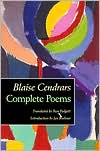Complete Poems
Blaise Crars was a pioneer of modernist literature. The full range of his poetry—from classical rhymed alexandrines to "cubist" modernism, and from feverish, even visionary, depression to airy good humor—offers a challenge no translator has accepted until now. Here, for the first time in English translation, is the complete poetry of a legary twentieth-century French writer. Crars, born Frederick Louis Sauser in 1887, invented his life as well as his art. His adventures took him to Russia...
Search in google:
"At last! A superb translation of one of the great and greatly neglected Modernist poets! The map of Modernist poetry will never be quite the same."—Marjorie Perloff"Padgett's sparkling translations do marvelous justice to the eccentric and exciting poetry of Blaise Cendrars."—John AshberyPublishers Weekly``It's as if the brushes and palette of a painter / Had used colors stunning as gongs. . . .'' Along with Apollinaire, the French writer Cendrars (1887-1961) virtually created the modernist poem in 1913. Born Frederick Louis Sauser, he counted as his friends in Paris Leger and Chagall when the great revolution in painting took place. By breaking lines of verse to emphasize the jaggedness of conversation, Cendrars and Apollinaire structured events and images in their poems to coexist simultaneously; they adapted colloquial language to the planes and multiple viewpoints of cubism. But this was not a modernism that sacrificed the human to the machine. In ``The Prose of the Trans-Siberian and of Little Jeanne of France,'' Cendrars wrote of Paris: ``Great warm hearth with the intersecting embers of your streets and your old houses leaning over them for warmth / Like grandmothers.'' Nor was his process of composition like automatic writing. On Chagall: ``He takes a church and paints with a church / He takes a cow and paints with a cow.'' This volume, ably translated by poet Padgett, is the first to contain the all of the poet's work rendered in English. (May)
Translator's PrefaceIntroductionEaster in New York1The Prose of the Trans-Siberian and of Little Jeanne of France13Panama, or the Adventures of My Seven Uncles31Nineteen Elastic Poems51The War in the Luxembourg81Unnatural Sonnets87Black African Poems93Kodak (Documentary)99Travel Notes137South American Women201Various Poems207To the Heart of the World215Poesies Completes (French text)229Translators Notes on the Poems355Select Bibliography383Index of English Titles385Index of French Titles389
\ Publishers Weekly - Publisher's Weekly\ ``It's as if the brushes and palette of a painter / Had used colors stunning as gongs. . . .'' Along with Apollinaire, the French writer Cendrars 1887-1961 virtually created the modernist poem in 1913. Born Frederick Louis Sauser, he counted as his friends in Paris Leger and Chagall when the great revolution in painting took place. By breaking lines of verse to emphasize the jaggedness of conversation, Cendrars and Apollinaire structured events and images in their poems to coexist simultaneously; they adapted colloquial language to the planes and multiple viewpoints of cubism. But this was not a modernism that sacrificed the human to the machine. In ``The Prose of the Trans-Siberian and of Little Jeanne of France,'' Cendrars wrote of Paris: ``Great warm hearth with the intersecting embers of your streets and your old houses leaning over them for warmth / Like grandmothers.'' Nor was his process of composition like automatic writing. On Chagall: ``He takes a church and paints with a church / He takes a cow and paints with a cow.'' This volume, ably translated by poet Padgett, is the first to contain the all of the poet's work rendered in English. May\ \ \ \ \ Library JournalThe poems in this collection were written between 1912 and 1924, after which Cendrars stopped writing poetry, and they have never been published in their entirety in French. The poet was born Frederic Louis Sauser in La Chaux-de-Fonds, Switzerland, and his pseudonym links writing with a conflagration, a ``burning in use.'' Cendrars's life at that time alternated between widespread travel and extensive work in libraries. ``Easter in New York'' portrays the dysfunctional nature of Christ's compassion in the modern world. With its rapid succession of contrasts, words, images, and moods, the train in ``The Prose of the Trans-Siberian''--often compared to Rimbaud's ``Drunken Boat''--becomes a metaphor for the whirling of the universe. Translator Padgett unpretentiously conveys the vivid sensuality emerging from the rich profusion of Cendrars's travel experiences. Good reading for all lovers of 20th-century French poetry.-- Bob Ivey, Memphis State Univ., Tenn.\ \








